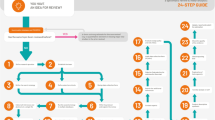Abstract
Assessment of evidence is becoming a centralpart of health policy decisions – not least inlimit setting decisions. Limit-settingdecisions can be defined as the withholding ofpotentially beneficial health care. Thisarticle seeks to explore the value choicesrelated to the use of evidence in limit-settingdecisions at the political level. To betterspecify the important but restricted role ofevidence in such decisions, the value choicesof relevance are discussed explicitly. Fourcriteria are often considered when settinglimits:
1. The severity of disease if untreated or treatedby standard care2. The effectiveness of the new technology3. The cost-effectiveness of the new technology4. The quality of evidence on (1)–(3)
The production and assessment of evidence isimportant for each criterion, but severalpoints are identified where the practice ofevidence-based medicine could be furtherdeveloped to capture a broader spectrum ofethical and political concerns that suchdecisions naturally evoke among citizens.
Similar content being viewed by others
References
Biller-Andorno, N., Lie, R. and ter Meulen, R. (2002) Evidence-Based Medicine as an Instrument for Rational Health Policy. Health Care Analysis 10, 261–275.
British Cardiac Society, British Hyperlipidaemia Association, et al. (2000) Joint British Recommendations on Prevention of Coronary heart Disease in Clinical Practice: Summary. BMJ 320, 705–708.
Creese, A.F.K., Alban, A. and Guinness, L. (2002) Cost-Effectiveness of HIV/AIDS Interventions in Africa: A Systematic Review of the Evidence. The Lancet 359(9318), 1635–1642.
Cumming, J. (1997) Defining Core Services: New Zealand Experiences. J Health Serv Res Policy 2(1), 31–37.
Daniels, N. (1994) Four Unsolved Rationing Problems. A Challenge. Hastings Cent Rep 24(4), 27–29.
Daniels, N. and Sabin, J. (1997) Limits to Health Care: Fair Procedures, Democratic Deliberation, and the Legitimacy Problemfor Insurers. Philosophy and Public Affairs (4), 303–350.
Dickenson, D. and Vineis, P. (2002) Evidence-Based Medicine and Quality of Care. Health Care Analysis 10, 243–259.
Drummond, M.F., Richardson, W.S., et al. (1997) User's guides to the Medical Literature. XIII. How to Use an Article on Economic Analysis of Clinical Practice. A. Are the Results of the Study Valid? The Evidence-Based MedicineWorking Group. JAMA 277(19), 1552–1557.
Dunning, et al. (1992) Choices in Health Care. A Report by the Government Committee on Choices in Health Care. The Netherlands: Ministry of Welfare, Health and Cultural Affairs.
Fahey, T., Griffiths, S., et al. (1995) Evidence Based Purchasing: Understanding Results of Clinical Trials and Systematic Reviews. BMJ 311(7012), 1056–1059.
Guyatt, G.H., Naylor, D., et al. (1997) Users' Guides to the Medical Literature. XII. How to Use Articles about Health-Related Quality of Life. Evidence-Based Medicine Working Group. JAMA 277(15), 1232–1237.
Ham, C. (1995) Synthesis: What Can We Learn from International Experience? Br Med Bull 51(4), 819–830.
Ham, C. (1999). Tragic Choices in Health Care: Lessons from the Child B Case. BMJ 319(7219), 1258–1261.
Ham, C. and Coulter, A. (2000). Where are We Now? In A. Coulter and C. Ham (Eds.), The Global Challenge of Health Care Rationing. London: Open University Press.
Ham, C. and Locock, L. (1998) International Approaches to Priority Setting in Health Care: An Annotated Listing of Official and Semi-Official Publications. With a Selection of Key Academic References. Birmingham: University of Birmingham.
Nord, E., Pinto, J.L., et al. (1999) Incorporating Societal Concerns for Fairness in Numerical Valuations of Health Programmes. Health Econ 8(1), 25–39.
Norges Offentlige Utredninger (1997) Prioritering på ny. Gjennomgang av retningslinjer for prioriteringer innen norsk helsetjeneste [in Norwegian]. Oslo: Statens forvaltningstjeneste. Statens trykking, p. 18.
Norheim, O. (2003, forthcoming) International Study on Priority Setting. Report from Norway. In C. Ham and G. Robert (Eds.), International Study on Priority Setting and Accountability for Reasonableness. London: Open University Press.
Norheim, O.F. (1996) Limiting Access to Health Care: A Contractualist Approach to Fair Rationing. In Institute of Medical Ethics. Oslo: University of Oslo.
Norheim, O.F. (1999) Healthcare Rationing–are Additional Criteria Needed for Assessing Evidence Based Clinical Practice Guidelines? BMJ 319(7222), 1426–1429.
Pharoah, P. and Hollingworth, W. (1996) Cost Effectiveness of Lowering Cholesterol Concentration with Statins in Patients with and without Pre-Existing Coronary Heart Disease: Life Table Method Applied to Health Authority Population. BMJ (8 June) 312, 1443–1448.
Sackett, D.L., Richardson, W.S. et al. (1997) Evidence-Based Medicine. How to Practice and Teach EBM. New York: Churchill Livingstone.
Sackett, D.L., Rosenberg, W.M.C., et al. (1996) Evidence Based Medicine: What It Is and What It Isn't. BMJ 312(7023), 71–72.
Sheperd, J., Cobbe, S., et al. (1995) Prevention of Coronary Heart Disease with Privastatin in Men with Hypercholesterolemia. N Engl J Med 333, 1301–1307.
Smith, R. (2000) The Failings of NICE. BMJ 321, 1363–1364.
Statens offentliga utredningar (1995) Priorities in Health Care–Ethics, Economy, Implementation. Stockholm: Statens offentliga utredningar No 5.
Welch, H.G. and Mogielnicki, J. (2002) Presumed Benefit: Lessons from the American Experience with Marrow Transplantation for Breast Cancer. BMJ 324(7345), 1088–1092.
Williams, A. (1997). Cochrane Lecture. All Cost Effective Treatments Should be Free... or, How Archie Cochrane Changed My Life! J Epidemiol Community Health 51(2), 116–120.
Author information
Authors and Affiliations
Rights and permissions
About this article
Cite this article
Norheim, O.F. The Role of Evidence in Health Policy Making: A Normative Perspective. Health Care Analysis 10, 309–317 (2002). https://doi.org/10.1023/A:1022955909060
Issue Date:
DOI: https://doi.org/10.1023/A:1022955909060



